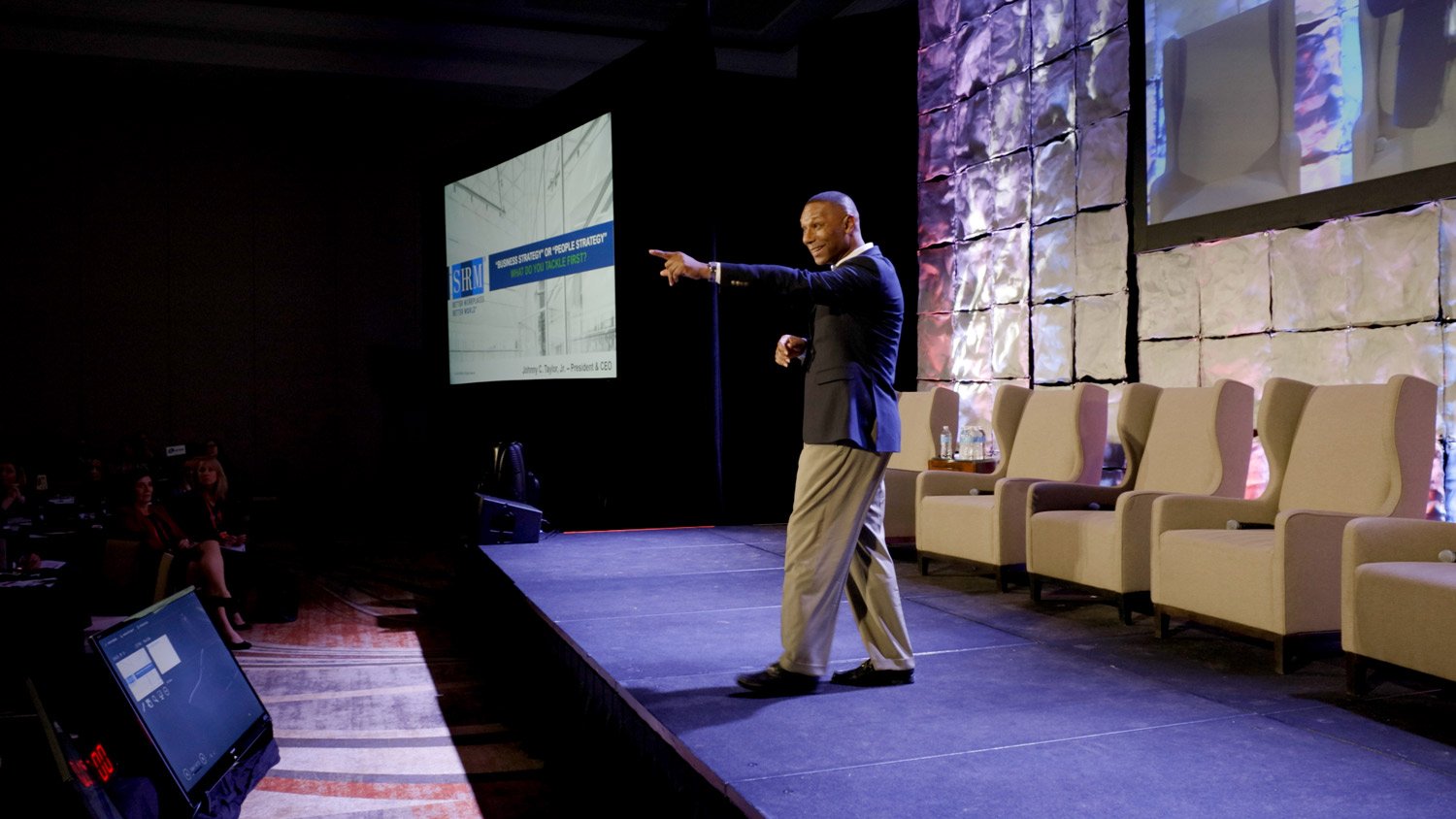
If you attended R3 last month, your head is probably still spinning with all the insights and info you received from keynote speakers, breakout sessions, and the stimulating conversations you had with your fellow VAAs. I know mine is.
Let me introduce myself. I’m Jaime Faulkner, your new content manager and the newest member of the marketing team at TTI SI. I’ve worn a lot of different hats in the marketing world, but content is my favorite area of focus. I’m a storyteller at my core, and I’m thrilled to join the team at TTI SI. My first time interacting with my team (besides the interview process) was at R3, TTI’s international, premier talent management conference. I attended as a guest, watched my future team excel behind the scenes, and learned a lot about the company and about you, our audience!
One of the topics that came up repeatedly at R3 was how companies can handle the human resource crisis in America. Johnny C. Taylor, Jr shared in his keynote speech that there is a 1.3 million person deficit in our modern workforce. We’re in a job seekers market — there are more open positions than available talent, and the gap between the two is only widening.
Your company can combat this disparity by working to become an attractor company for Millennials and Gen Z. Millennials make up the majority of the workforce, and while Gen Z are just now entering it in 2020, they will soon become major players in the global talent force.
During the conference, I heard over and over again in breakout sessions and keynotes alike that many business owners and leaders are struggling to maintain and engage young professionals in their teams.
As one of those young professionals, I can tell you exactly what makes TTI SI an attractor company for me. I can also tell you what your business can do to attract fresh, new talent for your team.
There are 3 things you can do to attract top Millennial and Gen Z talent to your business.
Cultivate Your Social Media Presence
If you want to attract young professionals to your business, social media has to be a top priority for your company in 2020. Job seekers aren’t going to end their investigation of your company with their job application. They’re going straight to your social media profiles to learn as much as they can about your culture, your interactions, and your brand.
“Candidates and employees are making decisions based on social media— their position at your company will contribute and develop their personal brand, so you need to consciously develop your brand for their brand,” said Ashley Bowers, the Chief Strategy Officer here at TTI Success Insights.
The content shared on your social media accounts can’t just highlight your strengths; it needs to add value to your audience. Authentic, data-based content helps build trust in your brand. Job seekers will notice.
While I was interviewing with TTI, I learned as much as I could about the company, the team, and the culture. I was able to dig into the blog, their social accounts, published research and even upcoming data compiled by their in-house Research department.” The wealth of information I accessed let me build confidence in their culture and mission before I even met the team in person.
Foster Transparent Communication
You can’t take shortcuts when it comes to authenticity. Millennials and members of Gen Z have been marketed to our entire lives. We have a keen eye for detail and can detect inauthenticity from a mile away.
“Younger generations are highly skeptical,” Jamie Taets shared at R3 in her presentation Beyond the Paycheck: How to Compete in the War on Talent. “They grew up after 9/11 and experienced the recession in 2008 as children and young adults. They didn’t grow up in a world of trust. Give your business an instant edge by driving dialogue in your community.”
Keeping information away from your younger team members and shutting down lines of communication will result in disaster for your success.
Harvard Business Review reports that Millennials want feedback twice as much as other employees, and they need feedback at least monthly, if not more frequently. This might feel like coddling or overcommunication to previous generations, but if you neglect to provide feedback, you’re neglecting your team.
During the interview process, I was in frequent communication with Sarah Merkle, our VP of People. I didn’t have to wonder when I was going to hear from TTI again; I was informed at the end of every interview what our next steps would be.
After learning more about my DISC assessment, it makes sense why this gave me confidence in TTI. I have a very high S in my adapted style, which means I like stability, loyalty, and reliability. I was looking for a company that would appreciate those characteristics and model that same behavior, and I found it; TTI SI has been leading the assessment industry for 35 years, and most of my new team has worked here for 5+ years.
I also received an abundance of feedback in the interview process, and it assured me that TTI was invested in making sure that we were the right fit for each other. They weren’t just trying to fill a seat, and it made me feel valued.
“Younger workers want to do more,” Jamie told us. “They want to make a substantial difference — harness that!” Communication is a crucial part of your culture, and that culture matters for attracting top talent.
Prioritize a Work-Life Balance
When sharing about your company values, you need to make sure to highlight your flexibility as an organization. If flexibility is not a priority, make it one.
Research shows roughly a quarter of Gen Z respondents are dissatisfied with their work-life balance. 18% of Millennials are as unhappy. This makes sense when you consider more than a quarter of workers take home work on a regular basis. Work-life balance is rapidly shrinking, and that’s a problem for the current and future workforce.
I’m a very young Millennial or an elder member of Gen Z, depending on your generational definition, so I understand the perspective of both groups. I’m willing to work hard on a deadline and take a lot of pride in my work, but I also value my family, friends, and hobbies very highly.
Investing in my life at home makes me a better worker; I am refreshed and ready to achieve at work when I know my home life is entirely my own. In the interview and onboarding process, TTI made it clear that here, family comes first. They answered my questions about company culture with confidence and passion, and made sure I knew that ‘people first’ isn’t just a tagline here.
Give your team the flexibility they need! If you think the option to work from home or a solid PTO allotment are useless amenities, you’re going to get left behind.
When you invest in your people, you show them that they are more than a means to an end. That investment will be at the core of your business’ success, and will continue to attract top talent.
Lock Down Top Talent in 2020
“Understanding what actually works to employ Millennials is critical for every business and industry — especially if you want your company to exist in ten years,” says Jason Dorsey in the whitepaper ‘Unlocking Millennial Talent.’
The features and considerations that the average worker wants shouldn’t surprise you. From the first time I read the job description for this position, I was intrigued by what TTI had to offer me, as well as what I had to offer them as a content manager. My team at TTI is working hard to ensure that this role will benefit me in both my professional life and my home life. That made all the difference for me.
Provide job seekers with the support and communication they need, and the flexibility they want. When you invest in young professionals and work to become an attractor company, you’re investing in the future success of your business. Simple as that.



